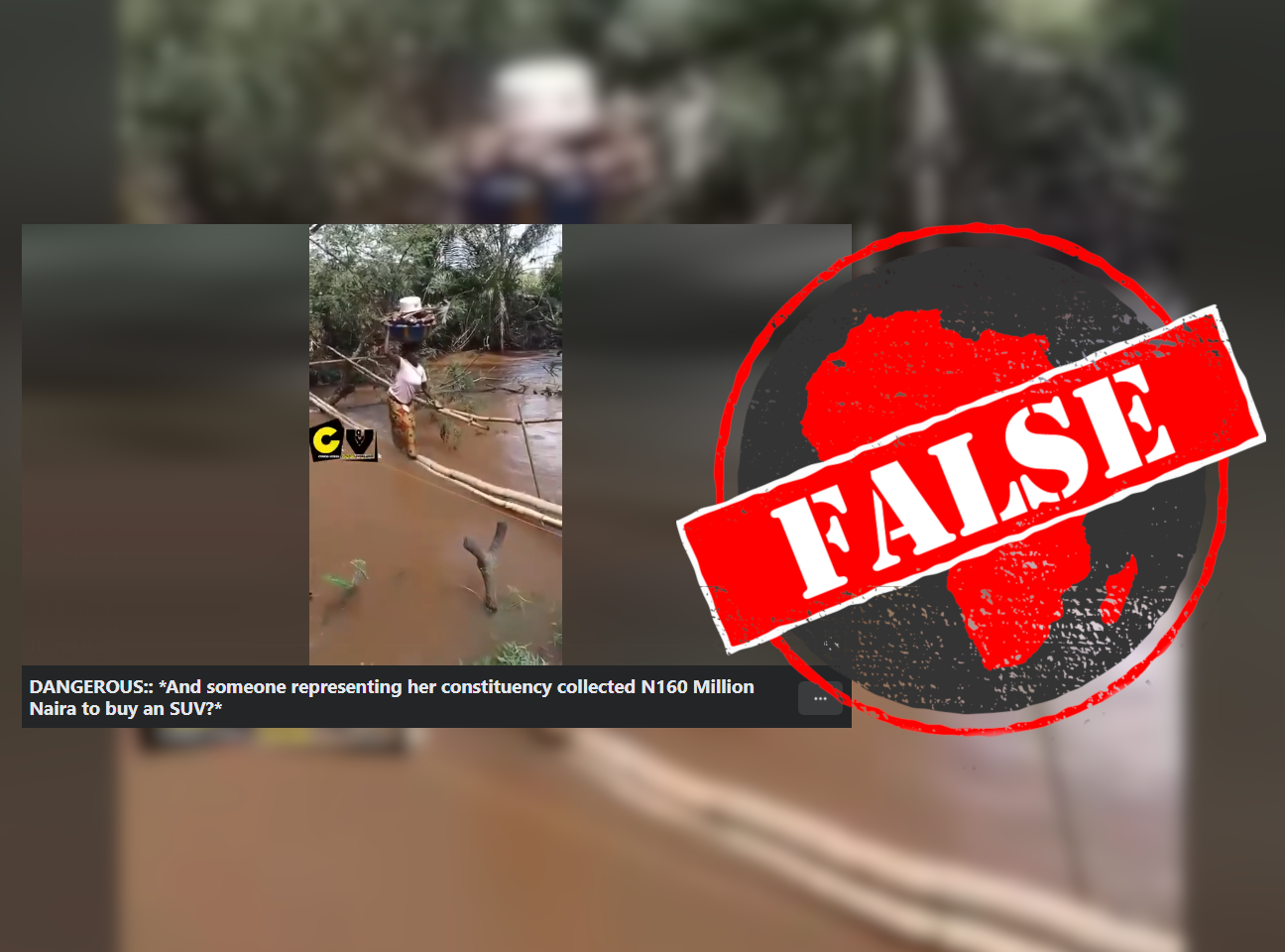IN SHORT: Some Facebook posts claim that a video of a woman crossing a makeshift bamboo bridge was shot in Nigeria. They also accuse a community leader of using public funds to buy a car instead of improving the infrastructure in the area. However, Africa Check has found no evidence to suggest that the video was shot in Nigeria.
A video of a woman trying to cross a river on a makeshift bamboo bridge is doing the rounds on Facebook. She is carrying a load of what appears to be wood on her head. She then falls into the river, while some people can be heard speaking an unidentified language in the background.
One caption reads: “And someone representing her constituency collected #160 Million Naira to buy an SUV?”
The post, which has over 1,200 views, suggests that the video was recorded in Nigeria. It claims that a public servant used public funds to buy a car instead of building a much-needed bridge.
Infrastructure is an important part of society, enabling economic growth through business activity, providing jobs and facilitating the exchange of goods and services. As seen in the video, a lack of infrastructure can hinder the movement of the people and sometimes puts their lives at risk.
Nigeria’s infrastructure deficit, which is 30% of its gross domestic product, falls short of the international benchmark of 70% set by the World Bank. That’s according to a 2023 report by Dataphyte, a media research and data analytics organisation in Nigeria.
The video was also posted on Instagram by Isaac Fayose, the brother of the former Ekiti state governor, where it received over 1,000 likes. The same video and claim was also posted here, here, here, here, here, here, here, here, here, here, here, here and here.
But is the video from Nigeria? We checked.

Location unclear
Language is one of the key ways to identify possible places where a video might have been taken. But Africa Check could not conclusively identify the language in the video. We thought we heard a few words in French, suggesting the setting might be a Francophone African country.
We then broke the video down into keyframes using Invid, a video analysis tool. We found a longer version of it on Facebook, captioned in French. According to Google Translate, the caption reads: “That's the living conditions of the population in a country of activists.”
The caption also names several artists from the Democratic Republic of the Congo (DRC) and DRC president Félix Tshisekedi Tshilombo. This indicates that the video might have been shot in the DRC.
The longer video features the TikTok logo and the username @gnral.courbure.nk. We searched for an account by this name on TikTok and found a similar video of another woman crossing the same bridge, posted on 2 January 2024. It is overlaid with this text: “Celle-ci au moins a plus de chance que l'autre.” Google translated this to: “This one at least has more luck than the other.”
“The other” probably refers to the woman who slipped and fell in the river.
Africa Check sent a message to the TikTok account to enquire about the location, but we have had no response.
A post on X (formerly Twitter) also includes the video, saying the “world has failed the people of Democratic Republic of the #Congo (DRC)”. Another Instagram account also tagged the video “Congo”.
We found no proof that the video was filmed in Nigeria.
Republish our content for free
For publishers: what to do if your post is rated false
A fact-checker has rated your Facebook or Instagram post as “false”, “altered”, “partly false” or “missing context”. This could have serious consequences. What do you do?
Click on our guide for the steps you should follow.
Publishers guideAfrica Check teams up with Facebook
Africa Check is a partner in Meta's third-party fact-checking programme to help stop the spread of false information on social media.
The content we rate as “false” will be downgraded on Facebook and Instagram. This means fewer people will see it.
You can also help identify false information on Facebook. This guide explains how.


Add new comment